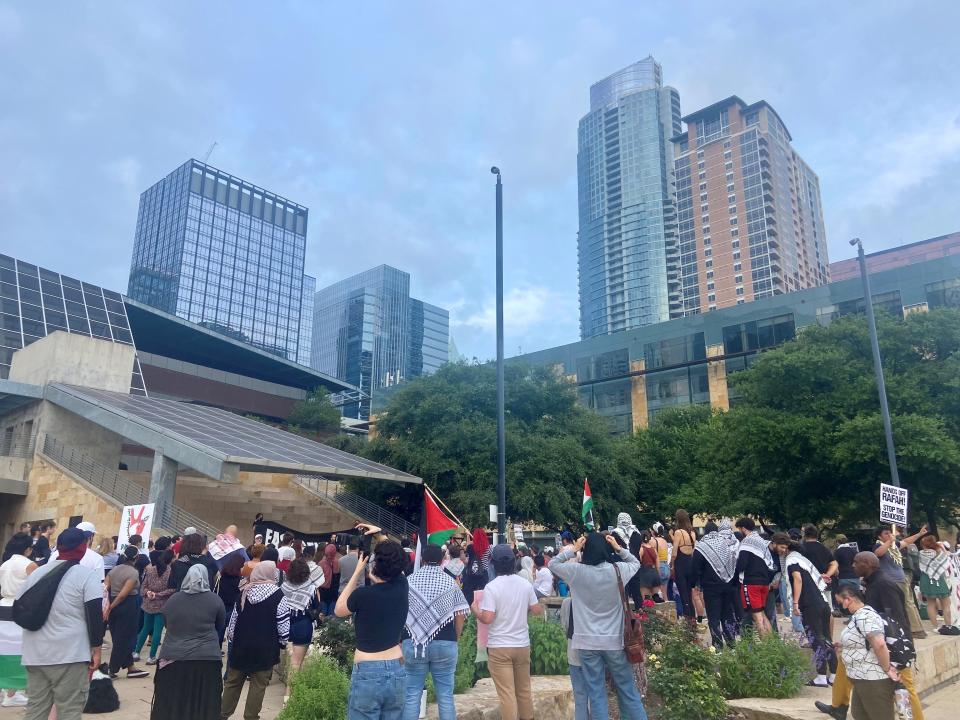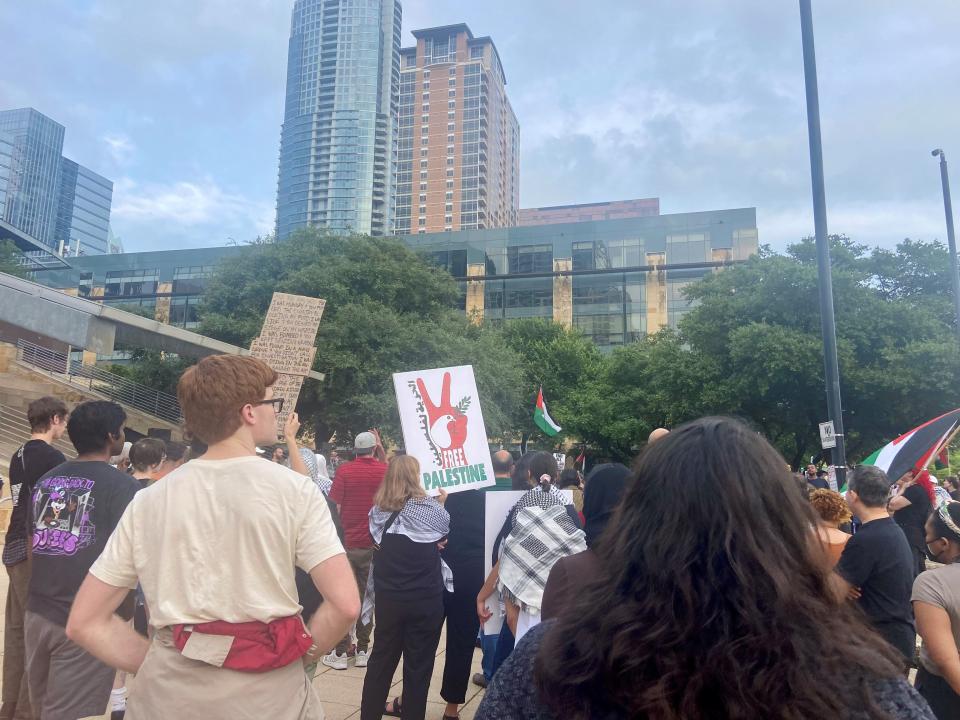Pro-Palestinian protesters condemn attacks on Rafah, lack of Austin cease-fire resolution
Four-year-old Safiyya Ahmed came out of a crowd of about 200 people at Austin City Hall, her purple mermaid flip-flops flapping on the pavement as she took the microphone from a pro-Palestinian protest organizer.
"Free Palestine!" she cheers into it the mic, as the crowd repeats after her. Her pink dress is peppered with watermelons, often considered a symbol for Palestinians because the colors resemble their flag. She attended the protest Tuesday night with her siblings, mother, father and grandfather.
Ahmed was one of several children who, along with their families, joined protesters at City Hall and took over the chanting when adults began winding down. The 4-year-old told the American-Statesman that she was chanting because of Israel.
"I want the bombs to stop," she said.

Local pro-Palestinian groups, including the Palestine Solidarity Committee, Palestinian Youth Movement and the Party for Socialism and Liberation, held the emergency protest Tuesday night at City Hall to raise alarm against Israel's invasion of Rafah.
Rafah is a densely populated city in the southernmost area of Gaza, bordering Egypt, to where Gazans had previously evacuated to escape Israel's bombardment of the northern region. On Monday, Israel told tens of thousands of Palestinians in Rafah to evacuate and later began what its military called "targeted strikes."
The invasion came after Hamas had accepted a cease-fire proposal drafted by Egypt and Qatar, but one that Israel said didn't meet its core demands. The United Nations, the U.S. and the International Criminal Court had warned Israel against invading Rafah, according to The New York Times, but the Jewish state has said it's necessary to put pressure on Hamas, the militant governing body of Gaza that orchestrated the Oct. 7 deadly attacks against Israel that killed about 1,200 people.
Since the war began, more than 34,000 Palestinians have been killed, according to the Gaza health ministry, Reuters has reported.
There were a few security officers present at Tuesday evening's protest, but no visible police force ― a stark difference from recent protests at the University of Texas, which have been met with large police presences from multiple law enforcement agencies. More than 130 people have been arrested during two pro-Palestinian protests at UT.

Protesters have gathered frequently at City Hall this year to call for the City Council to pass a cease-fire resolution, including last Thursday when they made their demands at a council meeting. Seattle, Chicago and San Francisco are among U.S. cities that have called for a cease-fire in Gaza, according to a Reuters analysis. A cease-fire resolution has not passed in Austin.
Lenna Nasr, an organizer with the Palestinian Youth Movement, told the Statesman the protest was held at City Hall to condemn Austin's lack of a cease-fire resolution, but she also wants to uplift the demands of students who are asking UT to divest from weapons manufacturers in Israel; reinstate the Palestinian Solidarity Committee, a registered student group that was placed on an interim suspension after an April 24 protest on campus; offer amnesty to students who were arrested; and that UT President Jay Hartzell, who with Gov. Greg Abbott called Texas Department of Public Safety troopers to patrol UT during the April 24 protest, resign from his post.
"This is political opportunism, and we must call it for what it is," Nasr said to the crowd about the lack of a cease-fire resolution. Now, protesters want a cease-fire that condemns Israel for the violence, calls for not sending any U.S. aid to Israel, condemns the police response to the UT protests and condemns anti-Palestinian violence in Austin, she said.
Islam Mossaad, a Muslim faith leader in Austin, told the protesters to persevere in their fight.
"We need to be steadfast here in Austin, Texas especially to show our brothers and sisters in Gaza and in the West Bank and wherever there are oppressed people that we will not leave them to stand alone, we will not leave them to suffer the bombs and artillery alone," Mossaad said. "We are with them."
Protesters chanted "Free Palestine," "From the river to the sea, Palestine will be free," "From the belly of the beast, hands off the Middle East" and "World leaders grow a spine, Rafah is a red line."
Nasr and other protesters also spoke about attacks on Muslim individuals near UT in February, which a police committee determined to be a hate crime, and an alleged bias-motivated attack on a UT student in April, and said the city has not done enough since to combat anti-Muslim violence.
City Council Member Zo Qadri, who attended and spoke at a pro-Palestinian rally held by UT faculty members after the April 24 arrests but was not present at the rally at City Hall on Tuesday, said during a phone call Wednesday morning with the Statesman that he has been in regular communication with Muslim faith leaders in Austin to ensure the community is safe, such as during Ramadan, and has aided communication between them and Austin police when necessary.
"Regardless of faith, we are a very present office," Qadri said. "I'm in touch quite a bit with leadership."
The city of Austin directed media inquiries about hate crimes to the Austin Police Department.
Ammar Ahmed, Safiyya's father, said his family has been to multiple protests to support Gazans and implore the government to listen to them.
"It's just horrendous what's going on, every day is more and more tragedy," Ammar Ahmed said. "Every several years or every decade, there's a defining moment in history where we as citizens of the U.S. and around the world, we have to stand up for justice, I think this is one of these times."
Ahmed is a UT professor, and he said the protests on campus follow a pattern of fighting for civil rights.
"Whether it's civil rights, whether it's South African apartheid, whether it's Vietnam, this is part of that same tradition of protesting," Ahmed said. "We all need to stand up for what's right here."
This article originally appeared on Austin American-Statesman: Pro-Palestinian protest at Austin City Hall condemns attacks on Rafah

